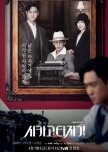
Touching. Exciting. Stylish. Passionate. Atmospherically dense, especially regarding the 1930s
For me, "Chicago Typewriter" needed a second attempt. The first time I didn't really know what to do with it. ...A smart spring chicken, but somehow paranoid writer, spoiled by success and money, and a cute girl as his fan? The story - fancy as it may come along - at first glance appeared a bit all too playfully shallow for my taste. I wasn't convinced. Although I actually really like actor Yoo Ah-in.Actually, I was mainly curious about the past (around 1930 when ´Korea´ was a colony of Japan). One of "Chicago Typewriter"'s two storylines is set in the context of the 1930's Gwangju student movement. With regard to the KDrama´s historical plot line though, it felt like nothing really happened for a long time. Accordingly, when I first had tried to watch "Chicago Typewriter", I didn't make it past the "beginning". However, somehow I kept stumbling across this KDrama and it wouldn't let go off me. Eventually I gave it another try. Lo and behold, with a little patience, the KDrama took me by the hand and developed an exciting story with a lot of passion and atmospheric density, especially when it came to the 1930s. The insight into that time had lasting impressions. Still, the relationship dynamics between the leads especially in the present time story line sometimes were little too light-weight, harmless and on the verge of silliness for my taste. However this was perfectly balanced in the context of their mission in the past and got more profound as the story proceeded.
------------------------- SIDE NOTE: --- Japanese colonialism ---
During the 1930s Japanese imperialism had reached its peak. In relation to Korea, a rigorous policy of assimilation, using force if necessary, was pursued, e.g. the Korean language, culture and history were systematically suppressed as part of a Japanese colonial education. The first Gwangju student movement, which culminated in a nationwide anti-Japan demonstration, happend in November 1929 after a female Korean student having been molested by Japanese students. This attack was certainly not the first, but the Korean student movement had formed in such a way that a large-scale street demonstration in Gwangju spontaneously took place after this incident. The mood swept across the whole country...
-------------------------
As a premise, the KDrama plays with the concepts of reincarnation and the concept of spirits remaining in near-earth realms after their death, until their unresolved past experiences are somehow redeemed. Both are popular motifs that are often picked up in KDramas. In this case, the producers have created a particularly beautiful and profound story, especially with regard to redemption. In 2017, the characters get a second chance, so to speak: they have the choice of whether they want to continue in their familiar pattern or make new decisions. There´s an opportunity to reconcile past guilt or open questions, to let go of the energy that still hangs in the past and to move on in the NOW. This aspect of time jumps is unabashedly and creatively juggled with an undeniable love for details. One of the protagonists, whose spirit since 1930 hasn´t been able to leave the earthly realms, becomes the connecting and driving force that knots both timelines. A special charm: The ghost from back then becomes a "ghostwriter" in 2017 when he meets his reincarnated comrades-in-arms. Another punchline: the title "Chicago Typewriter" is ambiguous, referring both to the typewriter as a "weapon" (with typed words) of the student underground movement, and to the Thompson machine gun - a rapid-fire weapon that was fashionable at the time, its nickname being areference to its characteristic rattling sound when launched.
As the story progresses, the rhythm of the present day being intertwined with the past - in the form of sudden memories or dreams - accelerates. The faster the time jumps, the higher the tension rises. It's actually going to be really dramatic, both in the past AND present...
In sum: the KDrama is giving you a clear idea of living under Japanese colonialism and of the resistance movement that rebelled against it. "Chicago Typewriter" is also a feast for the eyes in terms of fashion and equipment - both 2017 and 1930! "Chicago Typewriter" is first and foremost a moving story about friendship. And not to forget: a touching love story ...
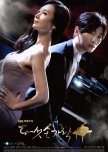
A must-have for makjang-lovers. A roller coaster of evil where you end up feeling for the worst, too
"Five Fingers" is a must-have for all those who love "makjang". A roller coaster of evil... and it doesn't stop. The spectators are allowed to tear their hair, wriggle, turn, annoy themselves to the bitter end... It's about the piano, too - some battles take place while playing, being around and doing business with the grand piano.This is about family and South Korean family values/virtues in particular. Submission to the value system is declined as a virtue in all its fatality. In the interweaving of events, the viewer inevitably faces the question again and again: is it virtue or stupidity, virtue or impertinence, virtue or arrogance?
The series dates from 2012 and makes a cunning attempt to challenge viewers to confront the value system. The rebellious thoughts inevitably arise in the minds of the viewers, because the well-meaning decisions that the protagonists make over and over again drive the values surrounding family (love) to the absurd and trigger suffering one after the other.
The ambivalence inherent in this is exploited perfectly. The actors do their part.
With 30 episodes there may be a tendency to flee in between, but I don't know anyone who didn't stick it out to the end. The ending may not be the classic happy ending, but it may be the true happy ending: the wheel of fortune comes to a standstill. Peace.
At first glance, the greed for money and power seems to be the driving force behind all evil. But actually it is the greed for love and recognition. The wheel of fate and suffering has already been turned on long before the protagonists - the two half-brothers In-ha and Jin-ho - compete against each other. To a certain extent they live out the unresolved conflicts of their parents. If you want to ask who is to blame for everything, then the root goes back a long way. The father pulls the strings out of the grave and it goes even further. A nice psychological study. Especially since you can't help but feel sympathy for everyone, even the worst troublemakers.
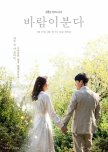
Years after the “Yes”-word, and yet a substantial love story, touching without being kitschy
"The Wind Blows" sounds quite inconspicuous, but it is not. It turns out to be a moving love story. Actually it is rom+/-com that starts exactly where other love stories end: with the ´yes´ word. The KDrama tells of what can happen when the butterflies (in the face of the new) are followed by ordinary years of shared, sometimes painful everyday life relationship... But that's not why love has to be gone missing. On the contrary... yet eventually, love might find it harder to take its space...The title "The Wind Blows" refers specifically to the moment when the two protagonists first met many years ago. At that time the wind was blowing. What started then is not over yet. Figuratively, the wind is still blowing. However, the everyday challenges of aging have now added to their married life. The two must meet those challenges. It is rather common that one may be tempted here and there to make solitary decisions instead of communicating. One may have doubts if there still can be a way together. Every now and then it seems that such a common path is not (or no longer) possible. And then, maybe, one or the other might open up again.
"The Wind Blows" tells a serious and profound story about a love relationship that has grown out of the first romantic phases. Generally, this is less wanted on screen, as it inevitabely comes with problems, arguments and breakups. (Somehow that's in the nature of relationship - the constant rubbing against each other in a wide variety of ways actually leads to feeling/sensing yourself and the other person in the first place... it doesn't work without it. Does it?) In this KDrama, problems, arguments and breakups are all in, too. But so is love. (...as so often, although we might fail to notice in the midst of turmoil.)
I don't want to hide the fact that Alzheimer's disease is involved here as a stab in the back and at the same time a second chance. Against this background, the story manages to tell sensitively, empathetically and at times ruthlessly about the bumpy stretches of a patient love that has been and remains there over time - even if it is experienced differently over the course of the years, perhaps sometimes cannot be shared and also has changed its forms of expression over time.
The sensitive processing and the emotionally intense acting (great: Kam Woo-sung and Kim Ha-neul) are KDrama quality at its finest, which has once again proven itself to be just perfect for dealing with such a complex subject, which is difficult in several respects. A substantial story, touching without being kitschy.
(Well, I didn´t need the slightly shallow subplot and few unnecessarily humorous sequences here and there. Yet they obviously tried to loosen things up... well...)
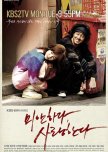
Truly touching. It makes you angry and concerned, too. You will ride in a rollercoaster of emotions.
"Sorry, I Love You" is an early masterpiece of proven KDrama art, which once again juggles the injustices of ordinary people with sensitive finesse in an emotionally draining manner - against the background of a South Korean sensitively reinterpreted Romeo & Juliet love story.Humiliation, exploitation, devaluation are the everyday life of the socially weak, while the celebrated, influential contemporaries seem to know no shame in their arrogance and haughtiness.
So Ji-sub hauntingly embodies subtly controlled, concentrated, suppressed anger. In the character of the protagonist, hate and compassion, love and indifference are combined in a fatal mixture. He becomes an incalculable time bomb that could be activated at any time.
Of all the early Makjang-infused KDramas, "Sorry, I Love You" is one of my favourites. Even if 'love' is bold in the title, the story doesnt´t romanticize it in a striking and cliché-like manner, yet the KDrama tells the story understated elegantly, but no less touchingly and also sincerely (...and of course dramatically tangled in a complex way.)
There is brother rivalry, revenge, swapped babies, secrets, complicated feelings, accidents, illnesses - the whole program prepared in a new mixture. The KDrama expresses in a concentrated, mostly subtly restrained (and thus even more vehemently impactful) emotional force how arbitrary, mendacious and unfounded it is that some people believe, they are 'justifiably' above others and thus have the given right to make decisions about them.
The KDrama uses a rarely found dramaturgical move to give the emotional force of the collision of two worlds even more power: the protagonist was put up for adoption abroad as a child. So he not only grew up with the feeling of not being wanted, but also with other western socialized (Australian) values. Subservience and humility are not among his strengths. He tends not to respect people in authority, or at least the authority has to prove itself as such first. He often acts disconcertingly strange. In South Korea, however, manners and respect for the elderly and higher ups are everything. Since he's Korean, people hardly pardon his naughtiness (as they would an obvious foreigner).
A touching story that makes you angry and also concerned. You will ride in the rollercoaster of emotions - while one emotional looping has not yet been completed, you are already on the way to the next.
-------------SIDE NOTE: ---overseas adoption of South Korean children---
...is a sad story that began after the end of the Korean War. Since then, around 200.000 children have been adopted, primarily from families in the USA, but also from Canada, Australia and Europe. First they were war orphans, then children from poor families, but then also children from illegitimate or divorced backgrounds. In the 1970s and 80s it became a profitable business. On the one hand, the government imposed veritable quotas on the adoption agencies. On the other hand, demand from western countries was high. Corruption flourished in places - the children were given away to the highest bidder. A halt to adoption in the face of international criticism was followed by renewed liberalization of legislation - as a result of the (lack of) adoption policy of the past decades social system was not prepared for the number of 'orphans' (actually: abandoned children).
Most of those ´orphan´ children have now grown up. There are quite a few, who organize themeselves and advocate for change. They want others to spare the trouble of growing up in a country, in a culture in which they are seen as strangers and bullied for being different and confronted with racial prejudice. In many cases they remain strangers and outcasts, as their country of origin cannot be/become a home for them either. The 'hatred of the homeland' is probably rather high among foreign adopters. In 2004, when the KDrama was released, the mood in South Korea was sensitized to the concerns of foreign adoptions and so a critically discussed topic was filled with 'life' by this KDrama. In 2006, an adoption day was introduced in South Korea and finally, since 2007, the numbers have shifted: there are now more domestic than foreign adoptions in South Korea...
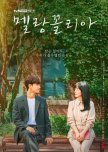
Richly layered. Excellently staged.
"Melancholia" is silently impressive. If you're just looking for a sweet romance, you'll be disappointed. Still, the story is a tribute to love. It's also about school, education, South Korean madness about education and the market around it, the arrogance of the top 10 percent of society, as well as bullying and intrigues for optimal certificates. Altogether it´s ambitious in several respects."Melancholia" is about the love for mathematics. Mathematics is for the protagonists what notes are for music lovers or colors for artists: a way to capture and express the beauty behind the beauty of life and the aesthetics of life on this planet. In "Melancholia" there are two people (and actually two more) who recognize this beauty with their mathematical 'sense organ', feel it deeply, understand it, and want to delve even deeper - thus see and meet each other and understand how they feel inside.
"Melancholia" refers to "Melancholia I" - one of the three master engravings by Albrecht Dürer - mentor and student look at it together in the context of the story and communicate about it, understand it, and doing so get closer. The Dürer artwork is an allegorical composition peppered with geometric elements and symbols. There are a wide variety of interpretations in the professional world. The two protagonists in the KDrama are inspired by this and enthusiastically help interpret. In connection with "Melancholia I" by Dürer, his sentence "But I don't know what beauty is" has also been handed down. This creative crisis, through which every creative person (whether mathematician, artist, etc.) has to go through at some point, is processed in the KDrama in its own way - in the first half the male protagonist and in the second half the female protagonist is struck by this question. Individually both are thrown off track and have temporarily lost sight of their joyful creative power. They inevitably stand in the face of melancholy - to some extent a dark, black tunnel, that opens up the passage to a new, luminous dimension of their creative power.
With regard to the student, the first half of "Melancholia" focuses on a variation of Weltschmerz, which is at the same time an expression of suffering from the beauty of the world. The protagonist can't help but see this perfection of aesthetics in everything everywhere. And yet he is alone in this. He cannot convey his perception, cannot share his experience with his fellow human beings. That's way too high for the others. Family, friends and even some teachers cannot relate or really understand what he is about. Some of his classmates may misunderstand him as a show-off and envy his genius. In fact, he suffers from the loneliness in which he is stuck. Not the beauty of the world. Yet all this changes after he meets a mentor who in the face of his 'brilliance' isn't (like many others) out for her own gain. Rather, she recognizes his rare ability of perception and gives it a grounded direction. She did not promote the genius, but the human being, who should not exploit his talent, yet learn to enjoy it. The mere experience that he is not alone with his way leads him out of his suffering. This is how he finds his place in the world and no longer has to withdraw and hide from it.
However, "Melancholia" also shows the mentor as she herself is stuck in an aloof, depressive phase. The motive is the same: also lonely, isolated, trapped in her feelings that she cannot share with a world that cannot understand her. And this time it is her student who can remind and encourage her to step outside and back into the world.
"Melancholia" is a hymn to higher mathematics, with which the beauty of life finds an abstract form(el) - but also to art, which tries to aesthetically translate the formulas and mathematical knowledge into new colors and new forms.
"Melancholia" is a homage to the love between two kindred spirits who recognize each other in their kinship and can't help but love each other (selflessly and unconditionally).
But "Melancholia" is also one of many stories in the shade of a brutal South Korean education industry that unscrupulously rides on the hopes, fears and worries of parents and students and repeatedly bears the bitter fruits of bullying, abuse, meanness, despair and fraud produces. In this context, a variation of it is once again told in an exciting, at the same time moving and excellently staged manner.
Finally , this story of the two main protagonists is both a new edition and a contemporary free reinterpretation of the relationship between of two historical mathematicians: the Tamil Srinivasa Ramanujan and the British Godfrey Harold Hardy. The KDrama refers to the extraordinary, intuitive mathematical skills of the historically real Tamil math genius, who was professionally recognized and promoted by the British Hardy. In 1913 Ramanujan came to England under the wing of his mentor and subsequently became known for several important discoveries. It is said that when asked what his own greatest contribution to mathematics was, Hardy said without hesitation that it was (his mentoring for) Ramanujan. He described their relationship as his only romantic experience in life. And with that he refers first and foremost to the very special form of eroticism of their shared, highly concentrated, soaring flights of intellect. Anyone who has never had this experience of a shared 'Eureka' will probably struggle with the romance aspect of this KDrama. Everyone else might experience it differently... .
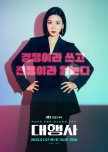
Women on the ball. Delighting, enraging, inspiring, concerning. Excellent script. High-end KDrama.
"Agency" has it all. Viewership has skyrocketed, as have ratings. "Agency" is the hit. Cool freshness, fashion, speed, one or the other rivalry as well as all categories of human manners, even the lowest, underline the handpicked lifestyle ambience. This all guarantees a lot of fun, seriously...The topic hits the South Korean nerve of the time. The nerve of women in particular, I should add. What may appear to Western eyes as an entertaining office drama with catfights has a completely different explosiveness in the eyes of Asian, especially South Korean viewers: The deeply hidden, rousing topic of the time, which affects everyone, is ´population decline´. The critical nerve bubbling on the surface revolves around ´sexism´ and ´misogyny´. The incumbent President Yoon proclaimed that these topics could be shut into history books, but "Agency" gives him the lie, right on. The KDrama clearly demonstrates how up-to-date it is. More than one South Korean woman in this story, no matter what position – down to the generation of the mothers of those mothers in the series - will find themselves here. And more than one man as well...
It is pleasing to see how razor-sharp and competent the female protagonist proves herself in this man's world. Also pleasantly refreshing side effect here and there: alternative model approaches for female vs. male management styles. And then there is the extravagantly privileged and insolent Jaebeol of the youngest generation who eventually is inspired to break free from her heavy chains of family-clan expectations. Besides their punching power, both lead ladies are palpable, too. Watching the series is a pleasure, even if the topics touched on may also arouse rather different feelings as well... A colorful bouquet of thematically critical, plot-relevant threads is dramaturgically subtly intertwined. In addition to the two female leads, there are also diverting (women´s lib) moving stories about Go Ah-in's employees and colleagues.
Stellar, good-humoured actors. Excellent script. A wonderfully balanced mixture of fun and seriousness, of pace and depth. The coherent details were undeterred on a differentiated, complex overall picture of the current business world. High-end KDrama-'pleasure' – delighting, enraging, inspiring and concerning. And while we are at it, "Agency" is innocently, smilingly, prettily and yet cleverly and valiantly placing a feminism-sting, too.
---------------------------------------------
SIDE NOTE: --- Misogyny and population decline in South Korean society ---
Without women it won´t do. But South Korean President Yoon has now officially messed with them. There was an enormous wave of protests when he announced that he wanted to abolish the ministry, which had been set up around 20 years ago to support women against sexual assaults and for equal rights, arguing the issue was no longer an issue. Immediately, around 800 organizations formed and stood up. President Yoon, who is promoted and sponsored by a strong conservative, patriarchal current, has blown a hornet's nest. His world – that of macho men – is obviously different from that of contemporary South Korean women.
It is a given fact, that misogyny in South Korea characterizes everyday life throughout all classes. Neither an entrenched, male-dominated business world from the bottom up to the boardrooms, nor professional disadvantage and discrimination of women in the workplace, belong to history yet. In the contrary, recently it has even been fuelled by the election of the current President Yoon. Fortunately, there are opposing movements and criticism. The KDrama "Agency" uses a socially critical magnifying glass here. Nevertheless, there is still a long way to go, although a drastic reflection is desperately needed, in order to be redirect economic development towards a positive light.
The current demographic trend is closely linked to the economic and social situation, which is shaped by antiquated patriarchal beliefs. Those old (apparently always happy to be taken off the socio-cultural shelf, dusted off, polished to a high gloss and then put back again) convictions stand in stark contradiction to the high pace of the high-tech modernity of everyday life in South Korea. This tense paradox is already having a negative impact (not just on women's attitudes towards life, but also) on the country´s economy. The official statistics on population development from August 2022 show declining numbers for the first time. Actually, the country's birth rate is the lowest in the world. There is no trend reversal in sight. The population will continue to shrink. And that is already and will even more so affect the economy. The proportion of women in the working population (at 55.1 percent) could certainly be increased. Although South Korean women are very well educated on average, only a little more than half of them actually bring their skills into business life. Among men, on the other hand, 73.7 percent are employed. This is due not least to the misogynist attitude in all areas. The difference in pay between women and men is estimated at 31.1 percent. Nowhere else in the 38 OECD countries is it THAT bad. Added to this is the disadvantage on the career path. Work-life balance is in its infancy, because the motto is: woman to the stove. Executive suites are for men only. Women are rarely seen here. And if so, then often only for ornament or to fill the image of an empty marketing shell (similar to "Agency").
It's high time that the many misogynists among South Korean men (including their president) arrived in the present. In the long run, a trend reversal can only succeed jointly – at eye level.
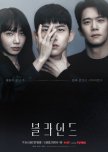
Exciting, yet gloomy thriller. The murder case being tried by a jury is just a kick off for more…
"Blind" is a fabulous, exciting, somewhat dark thriller."Blind" weaves its fictional story around 'survivors' of brutal child abuse and severely traumatizing exploitation as kids. These 'survivors' meet each other and their perpetrators 20 years later as adults. Each of those involved tried in his/her own way to come to terms with the past and lead a more or less normal life. Not only the abusive childhood, but also its psychological effects on their later life are a severe issue - and become a topic here. In addition, in this context complex interdependencies between the perpetrators of the time are dissolved and - against the background of a brutal variant of public vigilante justice - the original roles as perpetrators and victims are turned upside down.
"Blind" is haunting. The focus is on a murder case that is being tried by a jury. More murders follow. The dramaturgical setting is to some extent perhaps a bit reminiscent of an Agatha Christie novel - insofar as suddenly almost everyone in the case-related group of the selected jury could be the perpetrators... the distribution of roles between judges, investigators, victims and presumed suspects is also becoming increasingly opaque and fatefully intertwined. To pretend that one can turn a 'blind' eye to what used to be is no longer possible. Everyone must now look at the past and (even if it is perhaps a little late) bear the consequences. Magnificent.
----- SIDE NOTE: ---Child abuse - a sad and highly topical issue in South Korea ---
The thriller obviously saddles its story on the unspeakably sad topic of child abuse, which due to its unbroken topicality has increasingly made it into South Korea's series and film productions of recent years (among others "Children of Nobody" and "Mother" as drama or "Miss Baek" and "Bring me Home" as movie.) Many a well-established member of society prefer to look the other way when unbelievable deals are being made concerning minors, as long as they might even benefit themselves. And any 'survivors' can be glad if they manage to split off the traumatic experience to some extent - nevertheless most often PTS comes right along. Usually, those ´survivors´ until old age are psychologically still stuck in that desperate helplessness and inner agony of the past.
A South Korean government study from 2021 reveals, that abusive trafficking in minors has been rampant and even increasing in recent years. There is an acute need for action regarding more effective education in all public areas - from prevention to investigation and criminal prosecution up to employee training. A big problem with this: usually police officers or other officials are directly involved and work together with the traffickers, who specialize in the ruthless exploitation of minors. If the children and young people survive this, the psychological consequences of these deeply traumatizing experiences will be very hard - if at all - to be overcome. They are left helpless at the mercy of adults (who actually should take good care of them) and utterly hopeless in the face of a society that turns a blind eye to their torment. The only thing that is left: feeling betrayed and/or obviously of no worth whatsoever...
--------------------------
PS:
It may be that in reality a larger task force would have been set up to investigate the serial murders of the jury members. In my opinion, however, the KDrama didn't take anything away from keeping the circle compact in order to tell the story in its essential entanglements in a powerful way.
P.P.S.:
At last, I don't want to leave a pleasant detail (I think) unmentioned. We have seen it so often in KDramas: within the social ranking in South Korea, the older colleagues are obviously allowed to rebuke the younger ones with a shove, a kick or a snap on the forehead. (In view of my German socialization background, that is unheard of, but ...) In "Blind" one can now observe (among other things) that a transformation in this natural ranking behavior may be starting to happen within the younger generation: a colleague police officer in "Blind" actually gives back to his colleague and stands up for himself. So far, I have seen this rather rarely, if at all. Until now, as a rule in comparable situations, the fist usually remained in the pocket. In the mass consciousness, KDrama is relating to, starting 2022 such physical rebuke might obviously no longer be tolerated as a matter of course. Stand-up-for-your-rights seems to/wants to become possible - like a wind breeze of change coming up within a hierarchical tradition since centuries chiseled in stone...
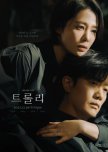
Its empathic. Powerful. Yet, beware: it is rather slow & actually not on the bright side of life
"Trolley" is a SBS production for South Korean TV first of all, even it is promptly running on Netflix, too. One could say that the KDrama is about a politician's wife, who is caught up in an emotionally draining past and overtaken by an extremely unpleasant present. One could say that it is about an ambitious politician with a promising career, who is in the middle of the national assembly election campaign and will give everything for it. One could say that it is about the classic moral trolley dilemma, which is running through the story like a key note – should one intervene in the unstoppable, catastrophic events and sacrifice one human life in the process, or let things take their course, the but then (in the case of the trolley dilemma) will claim several victims? With respect to each of these varying aspects, the story delivers suspense, depth and emotional intensity, enriched with complex details until the end.
"Trolley" is like a large patchwork quilt made up of many colorful, isolated, fateful pieces of the jigsaw puzzle that becomes a whole while increasing in suspense episode by episode. And this spectacular whole is what I particularly appreciate about this KDrama. Because the production is dedicated to a sensitive issue in South Korea society: the devaluation, harassment, oppression, contempt, discrediting, defamation, exploitation, sexualization of women and widespread physical violence against them.
The KDrama articulates a quiet howl calling for change. This howl, which has been rather mute for the longest time, wants a voice. This howl of pain wants to be heard. One voice should become many. Laws protecting women (and victims of abuse in general) would be all well and good. But even more so (and above all) there is a need for courageous role-models of women (and men) who lead the way. (Or for a start: KDramas and their e.g. female protagonists...) Role models are needed, who stand up for themselves, for their lives, for what happened to them, and for their rights as human beings. Tangible role models are needed embodying what lies at the heart of (these much-needed) laws: the non-debatable dignity inherent in every human being, regardless of gender, creed, birth, or ability. Paragraphs alone are not enough. They must be filled with life. With people who dare to actually venture out of the familiar swamp with their heads held high. And that's (for women) still easier said than done in South Korea 2023. "Trolley" embodies these circumstances in an impressive way. In fact, this is more than overdue. This TV production also places this message with some force and spreads it worldwide, too, so it cannot be overheard. Can it? May the message get through and encourage … women, young people, … and men too.
However, the spotlight is not directed at one or 'the' man as such, but at society as a whole, in which women structurally function (or supposed to function) well; in which they themselves participate in the premises - as mothers, as classmates, as part of a bullying, via public and Social media easy to manipulate crowd. The poisonous social thorn is so deeply rooted within women themselves: a systematically and consistently cultivated, inferior attitude towards their life. The the circumstances usually aren´t even seriously questioned because: that's the way it is… has been… (will be?)
Practically all of the women in this KDrama represent a self-esteem that has been deeply hurt and thus weakened as a result of private and public devaluation or even physical violence. They all somehow learned to live with it. They are battered, wounded and scarred, and they suffer from their feeling of inferiority that weakens them into old age. The worst thing about it: that they are still standing there alone, because nobody really can/wants to acknowledge their suffering and justified anger. Women have had to learn to live with the fact that there are no witnesses, no advocate, no encouragement, no attention, no consolation for them and their traumatic experience of harassment. No one is standing in their corner. The social message: You didn't deserve anything else. You´re to blame. 'Submissive, quiet, tame and silenced, everyone can do whatever they want.' Such is fate as a daughter. As an unwanted daughter. As the first daughter. As a daughter-in-law. As a wife. As a divorced woman. As an illegitimate mother. That something, which has remained deeply in these women, now shows impact, too: so that they either secretly and quietly devalue and question themselves, alternatively devalue others on their behalf, or let others devalue them on principle. This painful experience has not been redeemed to this day and should not be redeemed (from the social point of view of some). It is the ingrained yet invisible mark that South Korean society brands its women with. With "Trolley" it is out in the open. In multiple ways. Options for change are discussed, and the difficulties involved are also explored.
A strong portrait of society, cleverly prepared and seriously presented, yet in an entertaining manner. The KDrama meets a red-hot zeitgeist that calls for winds of change. The story courageously challenges the conservative, patriarchal attitude, which by nature denies women the right to be fully acknowledged human beings with the same rights. In the course of the last year, blood boiled high in South Korea after President Yoon declared 'structural sexism' being no longer existent in the Republic and wanted to abolish the Ministry for Equality and Family (or move it to other departments). In these times (see also the side note below), "Trolley" is a courageous and important production, because it tells a different story - that of devalued, sexualized, abused women in a self-satisfied man's world. Respect!
Its empathic. Powerful. Yet, beware: it is rather slow and actually not on the bright side of life.
---------------------------------------------------------------
SIDE NOTE: --- Always burning topical: violence against women in South Korea ---
If you compare the crime statistics in (i.e.) Germany and South Korea, South Korea is clearly the safer country. Seoul is arguably one of the safest cities in the world. But not for women...
Overall, violence in South Korea may be limited. But against women it is alarmingly widespread. Of the violent crimes recorded in South Korea, about 80 percent of the victims are women. In 2020, more than 58 incidents of sexual violence, including rape, were recorded among 100,000 residents in South Korea. (There were 12 in Germany for comparison). There have been newspaper reports of brutal femicides almost weekly in recent years. In a national survey conducted by the Ministry for Gender Equality and Family in the summer of 2021 (the ministry still existed then), 57.8 percent (!) of women stated that they felt threatened by misogynistic violence.
But the current political line is different. President Yoon stands for the values of the so-called "New Men's Solidarity". Behind this is a deeply patriarchal, conservative thinking that denies women to be full human beings with the same rights. Accordingly, the official line tends to go backwards: the penalties for false allegations of sexual assault are increased and the politicians rather argue with classic perpetrator-victim reversal: the women provoked the men by not doing what the men want them to do . Courts rarely judge in the interests of women. On the contrary. The outcome might be: victims of sexual violence are punished more severely than the perpetrators. Law against defamation of sex offenses is far stricter than that on sex offenses. It allows victims of sexual violence to be sentenced to up to 3 years in prison – even if it is proven that their publicly disclosed allegations are true. In the actual cases of sexual offenses, the verdicts against the perpetrators, however, are mostly merciful, with a mild sentence for crimes against women, as soon as there is one or the other weakening reason or an impeccable good reputation. Lax investigations and re-traumatizing behavior towards female victims in police and judicial authorities make matters worse.
All in all, it is very difficult for women to effectively defend themselves against the violence they might have experienced. Headwind blows from almost everywhere. Here we are again with the deeply patriarchal, conservative basic attitude of a society that denies women as a matter of course that they are full human beings with the same rights. This 'self-evidence' needs to be questioned and confronted. Resistance works best when women unite and at least start to stop this structural mutual devaluation among themselves. Speak, talk, share, cry, console... You don't need laws for that. Supporting one another, acknowledging injustice as such, comfort and compassion would be soothing ointments on the wounds of countless women that could heal a little bit better that way.
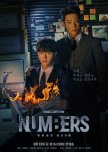
Don't be deterred by a supposedly dry accountants´ world. It´s feisty. Suspenseful. Emotional, too
"Numbers" is about auditors, balance sheets and accountants. It's obviously all about numbers. That may put some people off. It's also about what lies behind those numbers, and that may at times seem even more complicated to the uninitiated. However, deliberately illustrative examples are repeatedly interspersed. And it is even more gratifying that it is not necessary to understand all this in every detail in order to enjoy the series. “Numbers” is about a rational and clever mastermind. Yet it is also about having the heart at the right spot. It´s feisty. It´s also emotional. It stands up and means it. Great!"Numbers" is definitely worth it getting involved in the abstract world of accounting specialists. Especially since their decisions, in turn, have consequences for a world that juggles numbers even more aloof - Investment Fonds... While the auditors keep an eye on the current state of the balance sheet and put its potential through its paces, investors only care about future returns and often want the maximum profit regardless of the losses - which others have to bear for it.
Numbers are numbers. But the decisive factor is who has the sovereignty of interpretation. Numbers sound clean and objective, apparently. Yet, they stand for people, their visions and their decisions. Hidden underneath are solutions, too. As always, the question you´re asking, will make the difference – leading the way for your attention and focus. And as always, different possible perspectives exist. Also in the world of numbers.
"Numbers" is about a revenge campaign – again. There are actually several. It is about those who, with good reason, do not want to be intimidated by the power of the powerful – again. They have nothing (more) to lose. The bad guys are really bad. They have long lost their heart or never had one to begin with. This makes for plenty of interesting relationship dynamics.
"Numbers" also offers an interesting variety of intelligence and competence. Bottom line for revenge candidates – again: just on your own it is almost impossible to make a difference. However, someone courageously has to make a first clever and striking move ahead. With heart and soul. Then maybe others will remember that their heart was once in their right place, too. (In a rational, hierarchical world that takes for granted that there is no room for irrational emotions or personal interests, it's easy to forget just that.)
"Numbers" is a bold story about rather impure moves in the world of accounting and investment. A complex story. At the same time, an exciting, thrilling story that is fun, too. No matter how remote this world of dizzyingly high numbers may be for most of the audience, watching the story feels good overall. You get a high-flying, intelligent mixture. The actors show a strong presence in their roles and thus contribute a lot. The pace is right. OST fits fine.
My suggestion: don't be put off by suits, ties and a supposedly dry, conservative, number-dominated accountant business world. Sure enough, "Numbers" has it all!
------------------------------------------------------------------------
Side Note:
Banks in South Korea have been taboo for investors since the Asian crisis. For the bank sector, on the other hand, financial investment transactions are not permitted. Just now, in 2023, fundamental reforms were launched - some are even talking about a revolution. The banking sector is just now being opened up to new players in order to stimulate competition.
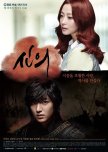
An epic historic love story, playing with time and space. Waggish. Affecting. Wonderful acting.
A special dramaturgical drive given by time travel and parallel worlds are quite common in KDrama. Thus contrasting perspectives from different backgrounds quite regulararly add unconventional fun and extra thrill to story dynamics.Additionally, KDramas like to chose a historically exotic context for its intriguing and romantic stories, while still giving them an epic scope. Even if not always historically exact, these plots offer plenty of material for drama and at the same time convey historical facts and heroes in a colorful dress. Epochal personalities and their impact come to life again. As Korean history goes far back in time, there are yet many more heroic stories to be told...
"Faith or the Great Doctor" combines both, the historical approach as well as playing with time and space in one story. In fact, history is thus presented even more funny and colourfully. On the historic side, this KDrama revolves around the legendary General Choe Yeong (1316-1388) who went down in history as the protector of the Goryeo Empire and its royal family. Incidentally, this is not the only KDrama that has been dedicated to him to date... As early as 1983, a series monument was erected for him in "Gyegook" and "Chu Dong Mama". He is also featured in "Tears of the Dragon" (1998), "Shin Don" (2006), "The Great Seer" (2012), "Jung Dojeon" (2014), and "Six Flying Dragons" (2016). You guessed it, he´s a real hero for the Korean Peninsula.
-------------------- SIDE NOTE: --- General Choe Yeong ---
Known for his strength from an early age, the son of a civil servant learned martial arts and studied books on military strategy. Over the centuries he had finally achieved the status of legendary protector of the Goryeo dynasty. Although he was also exiled for 6 years due to intrigues, in the course of his life this did not prevent him from fighting around 80 more battles in the service of the king. He lost his last battle against his former brother-in-arms, General Yi Seonggye, when he seized power in a coup d'etat in 1388 during the Battle of Liaodong. This was also the birth of the Joseon Dynasty.
-----------------------------------------------------------
"Faith or the Great Doctor" traces the path and integer character of Choe Yeong, whose motto has been handed down as "consider gold as if it were a stone". It´s obviously not pure poetic freedom when he is portrayed as sincere, stylish and gallant. And also does his combative superiority not seem exaggerated - his skills are historically documented. The focus of this KDrama is rather on the young general. He is not only presented as a strong leader, but as a young man who falls in love with a woman who is almost 10 years older. This (fictional) constellation offers some extra driving dynamics to the romance - as well as a comparably pleasant maturity at times as well.
The title plays with the different language styles in Korean - the old Hanja, which was written in Chinese characters until 1443, and the Hangul writing, which was newly created during the Joseon dynasty (and in which many Hanja terms have been preserved to this day.) So the original title "Sin-ui" may be understood both as 'trust in law and order' or as 'gifted healer'. In this sense, the title not only values Choe Yeong, the protector of law and order in the Goyeo Empire (refering to the Hanja translation), but also the gifted female healer (refering to the meaning in Hangul) - Eun Soo, a cosmetic surgeon from Seoul in 2012.
In the midst of waggish and heartbeat, this epic love story with all sorts of dramatic twists and turns absorbs within an eventful chapter of Korean history. The contrasts between modern and traditional medicine, somehow clashing in the middle of the 14th century, as well as between the almost rebellious, outrageous self-confidence of the by modern Seoul life spoiled doctor Eun Hoo and the ancient court of the Goryeo royal family guarantee 24 episodes of evocative entertainment.
"Faith or the Great Doctor" is an epic historic drama and at the same time playing with time and space. With two wonderful leading actors and more. The perfect mix for an epic Rom+/-Com.
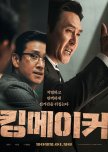
Political thriller, eloquently dealing with SK´s struggle for true democracy. Inspired. Profound.
Election campaign is a fight. But what rules should be applied? Do you inevitably have to hand in your ideals and ethics at the entrance as price for political success?Critical processing of South Korea's recent past - the democracy movement - is still in its infancy, because the dictatorship just finished a few decades ago and its proven structures within conservative circles are still resonating today. Increasingly, however, this topic is also taking up its media space. The political thriller "Kingmaker" sets a bold milestone by taking on a dazzling, comparatively upright, almost exemplary political personality, who for a long time seemed to have no chance in his sincere, ambitious fight for real democracy: Kim Dae-jung. He was the first opposition candidate to be elected President of the Republic. He is also the only South Korean to ever receive a Nobel Prize for his work on democracy and human rights. Some call him the Nelson Mandela of Asia...
In particular "Kingmaker" tells (in the plot prepared with some poetic freedom) about the early years of his political struggle and the arduous path that ultimately led him to the Blue House. The focus is less on his biography and more on what he still stands for in the eyes of most South Koreans today: real democracy. Or rather, against what he wanted to compete: the conservative, elitist, political cronies who stand in the way of progress and justice, if it is not in their own interest.
In the service of the electoral success, Kim (like so many politicians on this planet) was probably tried more than once to sanctify the 'good' purpose in the sights of many a morally questionable means. This difficult balancing act between an upright political attitude and one's own venality in a pact with a promising "devil" is illuminated and processed here in an impressive way. The temptation of a promising shortcut to success usually comes with a price that has to be paid sooner or later. (The internal struggle of 'for' versus 'against' shapes the decision-makers in South Korea with their well-established, conservative, shadowy networks to this day. This is actually writing daily history. And the TV and movie productions are full of it, too.)
The status quo - submission to the apparently influential 'more powerful' - is contrasted with a historically real personality. In order to convey the emotional dilemma in a dramaturgically clear way, Kim's campaign strategist of the first hours, Eom Chang-rok, was stylized as the main character and staged fictionally. In fact, little is known about him other than that he is said to have been brilliant and downright genius.
The story is about Eom Chang-rok's intelligent crisis interventions, solution approaches and election campaign strategies, some of which are in stark contrast to Kim's idealistic democratic values, that are always geared towards serving the people. The audience is confronted more than once with the question of whether the end might justify the means. Isn't the power of the people just a well-meant illusion after all? Wouldn't it be more efficient for the state leadership if a few (more or less) smart people decided for the many others in a short decision-making process? "Kingmaker" touches the foundations of political morality and ideology.
However, the KMovie also touches on very human weaknesses: the need for approval and the temptation to be seduced. These weaknesses are truly human and have to be dealt with by everybody - somehow, someday.
"Kingmaker" is a moving political thriller set in recent South Korean contemporary history about the stumbling blocks and challenges of true democracy. A democracy, that requires responsible, mature and accountable citizens. A democracy, that will always be challenged by the forces and networks operating in the shadows, whose goal is to incapacitate the citizens and instead rule for their own personal benefits.
An unpleasant subject, indeed. Yet the KMovie is eloquently dealing with this crucial issue for any democratic society.
A brilliant approach to this topic as well as to a younger chapter of South Korea´s history.
Inspired storytelling.
A profound production.
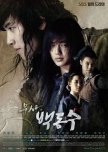
Epic and action are by a humorous ribbon tied together in a touching, gripping way. Go for it!
Set in a jaunty kaleidoscope of relationships, friendships, brothers in arms, blood ties, loyalty, heroism and heartbreak, the time of King Yeongjo, Crown Prince Sado and King Jeongjo is epicly (for a 2011 series production) portrayed."Warrior Baek Dong Soo" is full of fun, martial arts and of course: drama. There is politics, too, yes, butteh KDrama is definitely more on the drama and action side. I benevolently ignored some daring storytelling details and the selectively very optimistic choreographic freedom in the heroic staging. "Warrior Baek Dong Soo" balances between history and entertainment, between epic scope and personal tragedy, between deep, dramatic emotionality and airy, playful, humorous, good mood. The KDrama finds a rousing swell, in which the emotional waves are allowed to splash from all directions - with a story that sails between historically memorable facts, legendary heroes, steep (but by no means absurd) hypotheses, and colorful dramaturgical freedom. It offers great entertainment thanks to an exceptionally strong presence of all actors - whether young or old.
Baek Dong-soo himself is wonderfully portrayed by Yoo Jin-goo (young) and Ji Chang-wook (adult) in the sense of a largely impulsive jester who wears his heart on his sleeve. On the other hand, there is the introverted, somehow tragic, always serious and withdrawn Yeo Woon (Yoo Seung-ho as an adult and Park Gun-woo as a boy). The demanding life of the young warriors is sweetened by the unique charms of Hwang Jin-joo (cheeky, tomboyish: Yoon So-yi) and Yoo Ji-sun (stoic, reserved: Shin Hyun-bin). The by now veteran acting legend Choi Min-su as assassin lord in gothic style gives his very personal flavor throughout the 29-episodes long ride through time. And quite a few more there are.
In this KDrama it is rather the dramatic love story and love triangle of the older generation that pushes itself emotionally to the fore than that of the younger generation. This is probably due to the fact that Baek Dong-soo's generation is more dominated by humor and a cheeky mouth that wants to take on fate, while the older generation is dominated by the decades-long heavy burden of overwhelming life experience.
The historical hook of "Warrior Baek Dong Soo" is (as the title suggests) Baek Dong-soo, who went down in history as a heroic swordsman legend. He was one of three authors of the 'Muye Dobo Tongji' (= Illustrated Manual of Martial Arts), which is now officially classified World Heritage. This four-volume work summarizes the common weapon techniques of the Joseon period. (The book gained its extraordinary importance as a rare, valuable historical source on military affairs and Joseon martial arts, since older works fell victim to the destructive Qing invasions from the north.) However, swordsman Back Dong-soo first of all became legendary because he repeatedly saved King Jeongjo from being assassinated. And this juxtaposition of swordsmen serving the king versus assassins serving a however motivated client, originally inspired the 2010 KDrama comic entitled Honorable Back-Dong-soo.
The KDrama "Warrior Baek Dong Soo" thus also contrasts swordsmen and assassins - in terms of their ethics, their loyalty, their code, their mission, their training, their emotional world. This ambivalent and tragic dynamic makes the 29 episodes going and the time spent watching it worthwhile. They are so similar and yet they are worlds apart. One has to protect, the other has to kill. And yet, he who kills also protects. And yet, he who protects also kills. Both are henchmen. Both give everything. Risk everything. They're simply on different sides. Depending on the situation, the act of the swordsman is considered correct and honorable, while that of the assassin is considered a crime and vile. In my opinion, the KDrama reveals one of its strongest moments in the emotional explosiveness of the fatal bond between the first swordsman and the leading assassin lord (each of their own generation). They are so close emotionally and yet they live in different worlds: One in the light open, the other in secret. In tried and tested KDrama manner, the 'bad guys' (assassins) once again - despite the concentrated ambivalence of their characters - play their way taciturnly, but effectively into the hearts of the audience.
The framework for the plot is in beautiful continuity provided by sword fights and political intrigues. The flesh is made of fatal, ambivalent, intense relationship ties and feuds between the protagonists. History sets the direction. Epic and action are by a humorous ribbon tied together in a touching, gripping way. Go for it!
---------------------------------------------------------
Historical SIDE NOTE: --- Yangban of Joseon in the 18th century between conservative thinking and reformist, modern impulses. ---
The historical background of KDrama is shaped by three memorable decendants of the Joseon Dynasty. King Yeongjo, who holds the record-breaking 52-year reign on the throne, Crown Prince Sado, who went down in history as a tragic, possibly greatly misunderstood figure, and his son, who contributed to peace and prosperity as King Jeongjo. In addition to the serious efforts of the two kings for stability and progress, there are the divided camps among the nobles who fight by all means for their supremacy in political and social affairs.
Between 1674 and 1689 the Namin (Easterners) steered the administration of the country in their interests, followed by the Seoin (Westerners), who then entangled their position of power in disputes: the Noron representing the old, strict, conservative neo-Confucian doctrine and the Soron fighting for a new, modern, reformist, practice-oriented doctrine (Sirhak). It was probably King Yeongju's merit that despite the massive differences, the balance of power between the camps was well balanced for a long time. However, the price he had to pay for reasonably stable living conditions in the empire was his son, Crown Prince Sado, who favoured modern teaching and thus provoked the Noron. At least that is how one historical theory interprets the dramatic events surrounding Sado, who is said to have died locked in a box. The KDrama follows this theory (and not the annals, that present Sado as falling into insanity that could no longer be curbed, or a third theory that suspects a massive father-son conflict as the cause).
So, in line with the theory, which sees Sado as a progressive, reformist spirit, who wants to liberate his country from the supremacy of the Qing, "Warrior Baek Dong Soo" tells the story of the loyal followers of the ruling family, who are skilled in martial arts, and how King Jeongjo wants to live up to his father's modern visions. In doing so, with an open attitude the young king, too, always chose a balance and thus continued the proven political strategy of his grandfather, who in doing was able to stay alive more than half a century. In this way, King Jeongjo succeeded in the 24 years of his reign between 1776 and 1800 in building the Hwaseong Fortress as the center of his reign, in advancing education and science, in optimizing national defense and in creating the Royal National Library of Gyujanggak. However, he could never be sure of his life... at least seven assassination attempts alone during his first year in power are historically recorded. ... A striking reflection of the massive resistance against the attempted modernization of thinking in Yangban circles.
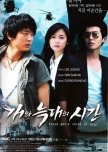
A spy drama right from the start
"Time between Dog and Wolf" is a KDrama from 2007. But don't worry, the series still knows how to grip today. (I don´t even dare to imagine what a terrific spectacle the KDrama would be, if it would come along in the style of 2020 KDrama cinematography...)The story starts - as so often back then - with the childhood days, e.g. the small and big traumata from that time. The entanglements are laid out and there's a lot in it Makjang-wise. However, it is not your typical makjang, The story is exciting, has a good pace and the shadowed complexity makes it difficult to see through. "Time between Dog and Wolf" is a spy drama right from the start and leaves hardly anything out.
The title sums it up quite well. Actually, this refers to the Latin metaphor "Inter Canem et Lupum" - between dog and wolf. In the evening twilight it is difficult to distinguish, so to speak, whether a wolf or a dog is standing in front of you, although you can just about make out that it will be one or the other. It's not pitch black yet.
However, this expression does not only refer to the twilight, but also contains another metaphorical allusion: This is the time when the wolf goes hunting and the dog seeks its bed... Who stands before me, though? Can I trust?
Thus the 16 episodes consistently maintain their twilight... Wolves (mainly) and dogs (a few) cross paths. Sniff each other. Fight each other. Join together to form a pack. Are hunted and hunt. Give themselves away. Make up for it. The one. The other. And others again. On top of all that, love puts plenty of salt into the wounds.
Ultimately, the symbol is even suitable for this KDrama in a third respect. In addition to the topics 'distrust/deceit', 'hunter/hunted', there is also the fact that both dogs and wolves are extremely social pack animals...
This is a KDrama that has a lot to offer in terms of exciting and moving entertainment. Lee Joon-gi shows edge here even at his younger age. But all of them express their emotions with some intensity. This does not go bye unnoticed.
The fact that a considerable part of the action takes place in Thailand also brings unexpected exoticism into the scene, which doesn't hurt.
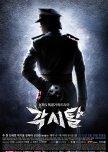
Epos, drama & national frustration with impact – about the birthing era of Korean nationalism
"Bridal Mask" is a South Korean variety of Zorro - in this case hiding behind a historical Hahoetal ceremonial mask used in Korean tradition for satirical theater and shamanistic rites. The avenger of Japanese oppression hides behind the classic mask 'Gaksital', which symbolizes an innocent bride.This brings us to the central theme around which the dramaturgical web was spun: Korea's time under Japanese protectorate (1905-1910) and the annexation as a Japanese colony that followed a few years later (1910-1945). In this context, this KDrama has a lot to do with national self-image of the Korean people, which is still formative today. (If you are interested: See Side Note below.)
Accordingly, "Bridal Mask" was very successful as a KDrama and was extended by 4 episodes due to its success.
"Bridal Mask" is about the desperate attempt of the oppressed population to counteract the notorious oppression of the Japanese tormentors. As the story progresses, the rather inexcusably conformist anti-hero becomes the avenger of the downtrodden, whereas the once benevolent, noble, antirassist teacher becomes the unscrupulous avenging angel. The daughter of a Korean resistance fighter provides explosive fuel, turning best friends into bitter opponents and rivals for the heart of their beloved. Everything becomes dramatic in the highest degree - the romance, the bromance, as well as the resistance struggle against brutal oppressors, with or without bridal mask.
'Gaksital' squeaks into the most diverse excesses of Japanese tyranny, above all: torture as a common method of interrogation. The hero also thwarts the insidious with false promises recruited young women as sex slaves or comfort women for the Japanese soldiers. Finally, by his activities his compatriots are also encouraged to engage in civil disobedience.
The tyrannical, ruthless attacks of the colonial masters are historically documented. Active resistance from the population as well. However, the actual plot of the KDrama is completely fictitious: A Zorro-like swordsman behind a traditional bridal mask is not known. Also, at the time of the Japanese invasion, Joseon was already severely weakened politically. In this case, the assassination of the head of state is poetic liberty. (At the time of the emperor´s actual death in 1919, the country had already been a colony for 4 years.) Finally, the secret organization of the ´Kishokai´ and their vision for a greater Japanese empire are fictitious. This Kishokai did not exist. However, there is a kernel of truth in it, because ultra-nationalist secret societies, especially those associated with Japanese military, apparently existed actually.
Overall, the K-Drama brings a black chapter of painful Korean history with epic impact and highly dramatic emotional entanglements back to life. Eventually, the memory is perhaps still so painful, because it wasn't all that long ago. To date, there has been no reparation, remorse, or at least acknowledgment from the Japanese side for the suffering inflicted.
Japanese colonial rule is inseparably interwoven with the very special Korean national pride, because this period marks the birth of Korean nationalism in the first place. And the KDrama builds on that. "Bridal Mask" in that sense is first and foremost a highly Korean production for a Korean audience. (Nevertheless it is obviously gripping for an audience with other national backgrounds, too.)
By the way, it may also be no coincidence that the series aired on TV in 2012, when the Korean government first formally asked Japanese Emperor Akihito for an apology...
----------------- SIDENOTE: --- Romantic Korean nationalism ---
Whether Goryeo or Joseon, since the tribes of the peninsula were united under one ruling dynasty, the people lived largely introverted and rather isolated from the rest of the world until the late 19th century. Here and there the borders have always had to be defended against invaders or retaken, but the people on the peninsula had nevertheless remained adamant and had not actually actively mixed with others. Today, there is often talk of 'pure ethnic blood', which provides the breeding ground for a more romantically (vs. civic) tinged national identity: A Korean usually feels descended directly from the original ancestors. Consequently, a Korean will typically identify first with his/her ethnic roots and only then, at some point, as a citizen of the Republic of Korea.
This very special national identity was directly born out of the developments associated with the opening of the country and an increasing international presence at the end of the 19th century. On the one hand there was hope for flourishing trade and technical innovation, on the other hand suddenly the USA, along with China, Japan and Russia, also wanted a piece of the pie and - more or less aggressively and consistently - took advantage of the opportunity and sometimes also inexperienced naivety of Joseon. As a result, resistance formed and the nationalist struggle for independence was born. It was necessary to use all conceivable means to preserve the nation´s autonomy and to protect the heart of Korean culture from invasions and encroachments by foreign nations. Particularly, resistance was directed against Japan's ruthless interventions in robbing the Korean people of their language, their own names, their religion and their dignity. Japan's declared goal was to discriminate against the Korean people and to assimilate them by any means (... and Japan wasn´t even squeamish with its own civilian population, being known for its brutality...).
At that time, Japan had deployed an omnipresent, almost overwhelming military and police presence that can hardly be compared with European imperialism as we (i.e. Europeans, as I am) know it. Hardly a day went by when the invaders did not have direct, mostly deliberately humiliating contact with the civilian population. So 4 traumatic decades can become a very long time...
This national frustration, pain and anger is still formative in the collective emotional memory. With "Bridal Mask",this receives a contemporary emotional safety valve in KDrama guise.
-----------------------------------------------------
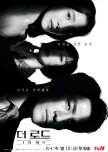
It´s opaque and rather gloomy, venturing to juggle shadow rather than light
"The Road: The Tragedy of One" is based on a (Japanese) novella by Rintaro Norizuki with its spotlight on the higher end of high society. The KDrama "Mine" from the same production year, which is located in a comparable segment at the top of the social pyramid, chose rich bright colors and extravagantly shimmering robes amidst glitz and glamor as the backdrop for a study on decadence and greed. In contrast, the TV production "The Road: The Tragedy of One" makes no attempt whatsoever to immerse human abysses in a colorful light that is somehow aimable and pleasently digestibility. No. This KDrama has a rather gloomy side to it. It´s opaque. Outrageous.You may vainly search for anything virtuous here. Let alone family values, especially when it comes to raising children. People mysteriously die. There is crime. Corruption. Affairs. Cowardice. Selfishness. There is (almost) nothing left of high moral standards. The series is heavy opera. Yet, excellently casted throughout. Everyone is doing their best. Still, whatsoever, it's not nice to look at. If the human ugliness is shown all too ruthlessly... who should one identify with? You have to delve far into your own abysses to sympathize and feel with the protagonists... (maybe one of the reasons, why the viewer ratings aren´t quite balanced to the true quality of the show...)
In any case, the KDrama is thrilling in its own pace and style. There are plenty of secrets throughout. You get Makjang, too ... obviously it can always get worse... (KDrama somehow always is great at drama!) It's opaque up to the end. The story takes its time to unravel the tangled threads. The screenplay is particularly atmospheric. Eventually, more of a trip into darkness. Literally (i.e. optically), too. I would call it an experiment in the latest KDrama Orbit, that dares to juggle shadow rather than light and ventures to tell a story without wholesome, easily digestible sweets.


 9
9 37
37 15
15


















